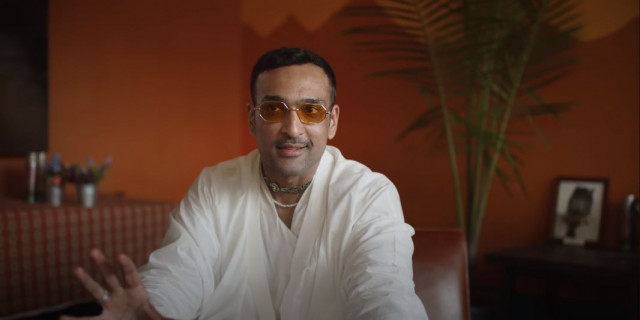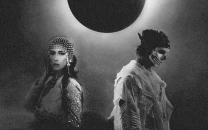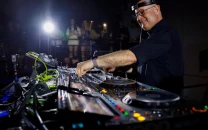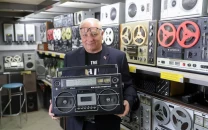Music was in the air where I grew up: Ali Sethi talks journey to Coachella and global stardom
Artist, among others, is part of docu-film 'Ascending – South Asian Artists at Coachella 2023'

A documentary titled Ascending – South Asian Artists at Coachella 2023 has been released on YouTube, revolving around artists like Ali Sethi, Diljit Dosanjh, Charli XCX, Jai Paul, Jai Wolf and Joy Crookes, as they or their managers walk fans through their individual and personal journey’s before landing at this point their lives.
“It’s surreal, it’s super surreal. I don’t think anyone ever thinks they’re going to be here and then one day, they’re here,” says Jai Wolf, kickstarting the 25-minute-long docu-film. The video goes on to shed light on Coachella 2023 line-up being a record-breaking manifesto of brown representation with faces like Rupi Kaur, among others, highlighting how a growing diaspora is attending the festival like never before.
Ali Sethi
“Music was in the air in Lahore, where I grew up. It was a part of the people. You would hear in shrines, on the streets, in homes – it was kind of, a spirit of us,” sharea Ali Sethi about his introduction to music in the docu-film. “As a child I kind of intuited that music was the way we came together as a people. So, I think I always wanted to study music, the music of my culture, the country I grew up. It’s been marginalized over time, it’s been deemed somehow less important than other forms of knowledge,” he laments.
Sethi’s manager Aroop Sanakkayala adds, “What really drew me to him was his vocal. He had this video for Ishq and it was just incredible. I don’t understand the language but his vocal I feel transcends all these different areas.”
Sethi further revealed that part of what drew him to raags, which is what he was drawn to as a child, were the feelings they evoked. “The feeling that whenever someone performs a raag or a traditional melody, everything feels okay all of a sudden. Everyone not only calms down but they start to dance and express themselves, move their head in a certain way, uncles start to move their hips in a certain way, aunties throw their dupattas off, all the good stuff starts to happen,” he elaborated.
The Pasoori hitmaker also shared that he was bullied a lot as a child because of his eccentric nature. But whenever he started performing, he felt like he had the license to thrill. Introducing his childhood friend Leo Kalyan, who was also a guest artist, Sethi continued, “We connected through music and theatre and here we are today at Coachella doing our queer brown thing.”
While on stage at Coachella, the artist is heard saying that Pasoori was a song about forbidden love… between nations.
Joy Crookes
British singer-songwriter Joy Crookes, who was born to a Bangladeshi mother from Dhaka and an Irish father from Dublin, shared that while growing up, she always listened to a lot of eclectic music. “My dad introduced me to qawwali music while my mom introduced me to Nelly Furtado. “I always listened to Reggae and Rock bands from the UK.” About her inspirations, Crookes mom recalled, “She used to listen to qawwali, to Nusrat Fateh Ali Khan. She’d always turn around and say that she wants to be a musician. It was the rhythm. We have a rhythm.”
“I never knew that I could do this professionally,” shared Crooke. “I never knew anyone around me who was that creative or had that kind of money so it didn’t seem viable but I always loved performing. But I can play at the biggest show in America.”
Jai Wolf
Jai Wolf informed, “I’m from Bangladesh and the Bengali people are very arts oriented. Whenever we have community events, get-togethers, there’s always a lot of music, there’s harmonium and singing. That’s the backbone of Bengali culture. Coming to America, my parents were always afraid that I would lose touch with that. So, for the first 18 years of my life I was a classically trained violinist. And while that was happening, my mom would transcribe Bengali songs with me into Western notations. I would play Bengali folk songs on violin.”
Wolf shared that like most South Asian kids, he grew up believing that pursuing music as a full-time profession would not be very lucrative because the parents always say, “Become a doctor, have a stable job.” Thankfully, though, Wolf told himself that ‘if I never tried, I would regret it for the rest of my life.”
Jai Paul
Music journalist Jashima Wadehra said about Jai Paul, “He is an enigma, but he dropped a release 10-12 years ago and it ended up getting sampled by Beyonce and Drake and his album got leaked and this is actually his first live performance ever, which is insane.”
Charlie XCX
About Charlie XCX, Wadehra held that her success is a testament to the fact that artists of any background can make music of any genera and be able to see success in that genera. “She’s incredible and I’m sure most people don’t know that she’s half Gujrati,” she remarked.
Diljit Dosanjh
Dosanjh’s manager Sonali Singh recalled how she first met him while she was working with Indian label T-series. “He’s an artist who’s traditional, cultural, yet, very global,” remarked Singh. The film cuts to show a glimpse of Dosanjh’s live performance at Coachella where he is heard saying, “Music is universal and shared by everyone. It doesn’t belong to any one person so please stay away from that negativity.”
The EVP of festival talent, Stacy Vee said about the artist, “So we know that Diljit is a global superstar. We research artists and data all day long and booking Diljit was one of the most exciting bookings we did.”
Wadehra held, “The thing that excites me most about Diljit’s performances is that people experience something they’ve never experienced before because South Asian cultures have a rich history of performance art. South Asians that music are not new, music in South Asian languages and from South Asian regions is not new. It’s just that, recognizing them while acknowledging their ethnicity is something that has been left out of media and of curation.”
South Asian ‘representatives’
Speaking in a similar vein, Wolf shared, “The best way to put it is that you’re either too brown for white people or too white for brown people. So, how do you meet in the middle?” Crookes chimed in, “I think the issue is that when you come from a minority background, in music, you’re seen as a representative. And you’re just like, I’m a passenger, and suddenly I’ve become the pilot. I think that’s really unfair. One day I just said, I’m not doing that anymore. I’m just going to represent myself, take it or leave it.”
Watch the complete docu-film here:
Have something to add to the story? Share it in the comments below.



















COMMENTS
Comments are moderated and generally will be posted if they are on-topic and not abusive.
For more information, please see our Comments FAQ